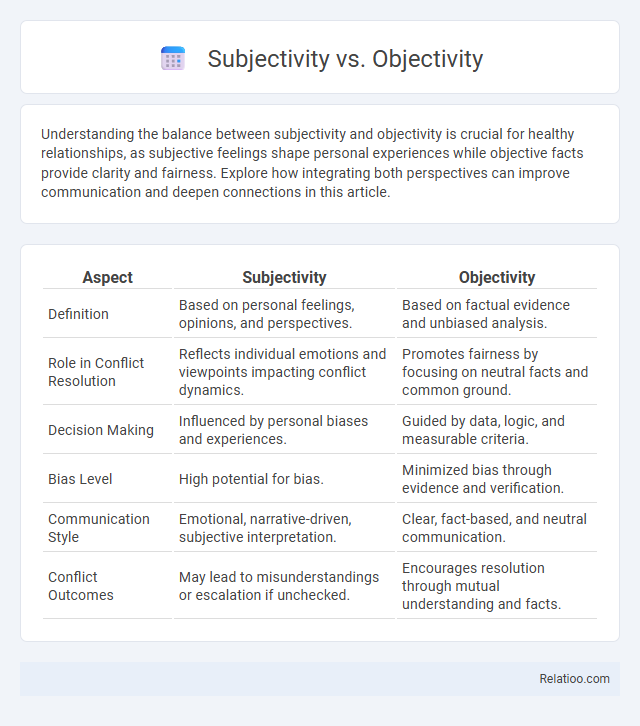Understanding the balance between subjectivity and objectivity is crucial for healthy relationships, as subjective feelings shape personal experiences while objective facts provide clarity and fairness. Explore how integrating both perspectives can improve communication and deepen connections in this article.
Table of Comparison
| Aspect | Subjectivity | Objectivity |
|---|---|---|
| Definition | Based on personal feelings, opinions, and perspectives. | Based on factual evidence and unbiased analysis. |
| Role in Conflict Resolution | Reflects individual emotions and viewpoints impacting conflict dynamics. | Promotes fairness by focusing on neutral facts and common ground. |
| Decision Making | Influenced by personal biases and experiences. | Guided by data, logic, and measurable criteria. |
| Bias Level | High potential for bias. | Minimized bias through evidence and verification. |
| Communication Style | Emotional, narrative-driven, subjective interpretation. | Clear, fact-based, and neutral communication. |
| Conflict Outcomes | May lead to misunderstandings or escalation if unchecked. | Encourages resolution through mutual understanding and facts. |
Understanding Subjectivity and Objectivity
Understanding subjectivity involves recognizing personal perspectives, emotions, and biases that shape individual experiences and opinions. Objectivity emphasizes unbiased, fact-based analysis, relying on observable and measurable evidence to ensure accuracy and neutrality. Balancing your interpretation requires distinguishing subjective viewpoints from objective facts to make informed and rational decisions.
Defining Subjective Perspectives
Subjective perspectives center on individual experiences, emotions, and personal biases that shape one's interpretation of reality. Unlike objective viewpoints that rely on observable facts and measurable data, subjectivity emphasizes internal thoughts and feelings unique to each person. Understanding subjectivity is crucial in fields like psychology and literary analysis, where personal meaning and individual perception influence outcomes.
What Constitutes Objective Truth?
Objective truth is based on observable, measurable facts independent of personal feelings or biases, forming the foundation of scientific inquiry and empirical evidence. Unlike subjectivity, which is influenced by individual perspectives and emotions, objective truth remains consistent regardless of who observes it. Your understanding of reality improves when you rely on verifiable data and logical reasoning that transcend personal interpretations.
The Role of Bias in Subjective Thinking
Subjective thinking is inherently influenced by personal biases, which shape individual perceptions and judgments, contrasting with the impartial nature of objectivity that strives for neutrality and fact-based analysis. Bias in subjectivity can lead to selective interpretation and emotional reasoning, affecting decision-making processes and the evaluation of information. Understanding the impact of cognitive biases like confirmation bias and anchoring effect is crucial in distinguishing subjective opinions from objective facts.
Objectivity in Scientific Research
Objectivity in scientific research ensures that findings are based on observable phenomena and unbiased data collection, minimizing personal or cultural influences. Maintaining objectivity requires standardized methodologies, reproducible results, and peer review to validate evidence. This approach enhances the reliability and credibility of scientific knowledge, distinguishing it from subjective interpretations or opinions.
Where Subjectivity and Objectivity Overlap
Subjectivity and objectivity intersect in areas where personal experiences influence empirical observation, creating a nuanced understanding that blends individual perspective with factual evidence. Your perception of events can shape interpretations while still aligning with measurable data, highlighting that some truths rely on both subjective insight and objective validation. This overlap is crucial in fields like social sciences and journalism, where balanced analysis depends on acknowledging emotional context alongside empirical facts.
Impacts of Media: Subjective vs. Objective Reporting
Subjective reporting in media often reflects personal biases and emotional perspectives, influencing audience opinion by shaping narratives through selective information and emotive language. Objective reporting strives for impartiality, presenting facts without personal interpretation, which enhances credibility and supports informed decision-making. The impact of these approaches affects public trust, media accountability, and the quality of democratic discourse, as subjective media can polarize audiences while objective reporting fosters transparency and balanced understanding.
Subjectivity and Ethics in Decision-Making
Subjectivity in ethics involves personal values, feelings, and perspectives influencing decisions, emphasizing the importance of individual context in moral judgments. Your ethical decision-making process becomes nuanced when subjective experiences shape the interpretation of right and wrong, contrasting with objective ethics that rely on universal principles. Balancing subjectivity with ethical standards ensures decisions reflect both personal integrity and broader societal norms.
Benefits and Limitations of Both Approaches
Subjectivity provides personalized insights by incorporating individual perspectives, which can enhance creativity and empathy but may introduce bias and limit generalizability. Objectivity ensures impartiality and consistency, making data-driven decisions more reliable while potentially overlooking emotional and contextual nuances important to Your understanding. Balancing both approaches allows You to leverage factual accuracy alongside human experience, optimizing decision-making across diverse scenarios.
Achieving Balance: Navigating Between Subjectivity and Objectivity
Achieving balance between subjectivity and objectivity involves recognizing the value of personal perspectives while grounding decisions in factual evidence and universal principles. Effective navigation requires critical thinking skills to evaluate biases, integrate emotional insights, and maintain empirical rigor across disciplines. This equilibrium supports well-rounded, informed judgments crucial in fields such as journalism, science, and ethical policymaking.

Infographic: Subjectivity vs Objectivity
 relatioo.com
relatioo.com